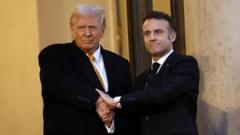On the third anniversary of Russia's full-scale invasion of Ukraine, a significant rift emerged during a United Nations General Assembly meeting where the United States diverged from its longtime European allies. In an unprecedented move, the Trump administration rejected a resolution that called for Russian withdrawal from Ukrainian territory, aligning instead with a stance that simply aimed for an end to hostilities without directly condemning Russia’s actions.
U.S. and European Allies at Odds Over Ukraine Resolution at the U.N.

U.S. and European Allies at Odds Over Ukraine Resolution at the U.N.
A notable discord erupted as the U.S. opposed a European-backed resolution demanding Russia's withdrawal from Ukraine at the U.N. assembly, signaling a shift in American foreign policy.
The resolution proposed by Ukraine demanded accountability for Russian war crimes and emphasized the ongoing devastation that the invasion has wreaked, representing a collaborative effort from mostly European nations. Ukraine's Deputy Foreign Minister Mariana Betsa highlighted the critical nature of asserting international support against aggression in her address to the assembly.
In contrast, the U.S. presented a much shorter resolution that notably avoided referencing Russian aggression or the context of the war itself. This marked a striking departure from previous U.S. positions, raising questions about the implications for transatlantic unity and the broader approach to global security concerning the Russian-Ukrainian conflict.
Adding fuel to the fire, President Trump’s recent derogatory comments regarding Ukrainian President Volodymyr Zelensky, whom many in the West have defended, further complicated the dynamics at play. Trump’s rhetoric, which inaccurately portrayed Ukraine as the aggressor in the conflict, underscored the widening divide in perspectives between the U.S. and its European partners.
This U.N. confrontation not only illustrates the evolving landscape of international relations regarding Ukraine but also serves as a reminder of the shifting allegiances and priorities that define contemporary geopolitical strategy. The split calls into question the durability of Western solidarity in the face of crisis and invites scrutiny into how differing narratives are shaping policy moving forward.
In contrast, the U.S. presented a much shorter resolution that notably avoided referencing Russian aggression or the context of the war itself. This marked a striking departure from previous U.S. positions, raising questions about the implications for transatlantic unity and the broader approach to global security concerning the Russian-Ukrainian conflict.
Adding fuel to the fire, President Trump’s recent derogatory comments regarding Ukrainian President Volodymyr Zelensky, whom many in the West have defended, further complicated the dynamics at play. Trump’s rhetoric, which inaccurately portrayed Ukraine as the aggressor in the conflict, underscored the widening divide in perspectives between the U.S. and its European partners.
This U.N. confrontation not only illustrates the evolving landscape of international relations regarding Ukraine but also serves as a reminder of the shifting allegiances and priorities that define contemporary geopolitical strategy. The split calls into question the durability of Western solidarity in the face of crisis and invites scrutiny into how differing narratives are shaping policy moving forward.




















